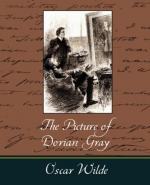“My dear Basil, how do I know?” murmured Dorian, sipping some pale-yellow wine from a delicate gold-beaded bubble of Venetian glass, and looking dreadfully bored. “I was at the Opera. You should have come on there. I met Lady Gwendolen, Harry’s sister, for the first time. We were in her box. She is perfectly charming; and Patti sang divinely. Don’t talk about horrid subjects. If one doesn’t [53] talk about a thing, it has never happened. It is simply expression, as Harry says, that gives reality to things. Tell me about yourself and what you are painting.”
“You went to the Opera?” said Hallward, speaking very slowly, and with a strained touch of pain in his voice. “You went to the Opera while Sibyl Vane was lying dead in some sordid lodging? You can talk to me of other women being charming, and of Patti singing divinely, before the girl you loved has even the quiet of a grave to sleep in? Why, man, there are horrors in store for that little white body of hers!”
“Stop, Basil! I won’t hear it!” cried Dorian, leaping to his feet. “You must not tell me about things. What is done is done. What is past is past.”
“You call yesterday the past?”
“What has the actual lapse of time got to do with it? It is only shallow people who require years to get rid of an emotion. A man who is master of himself can end a sorrow as easily as he can invent a pleasure. I don’t want to be at the mercy of my emotions. I want to use them, to enjoy them, and to dominate them.”
“Dorian, this is horrible! Something has changed you completely. You look exactly the same wonderful boy who used to come down to my studio, day after day, to sit for his picture. But you were simple, natural, and affectionate then. You were the most unspoiled creature in the whole world. Now, I don’t know what has come over you. You talk as if you had no heart, no pity in you. It is all Harry’s influence. I see that.”
The lad flushed up, and, going to the window, looked out on the green, flickering garden for a few moments. “I owe a great deal to Harry, Basil,” he said, at last,—“more than I owe to you. You only taught me to be vain.”
“Well, I am punished for that, Dorian,—or shall be some day.”
“I don’t know what you mean, Basil,” he exclaimed, turning round. “I don’t know what you want. What do you want?”
“I want the Dorian Gray I used to know.”
“Basil,” said the lad, going over to him, and putting his hand on his shoulder, “you have come too late. Yesterday when I heard that Sibyl Vane had killed herself—”
“Killed herself! Good heavens! is there no doubt about that?” cried Hallward, looking up at him with an expression of horror.




